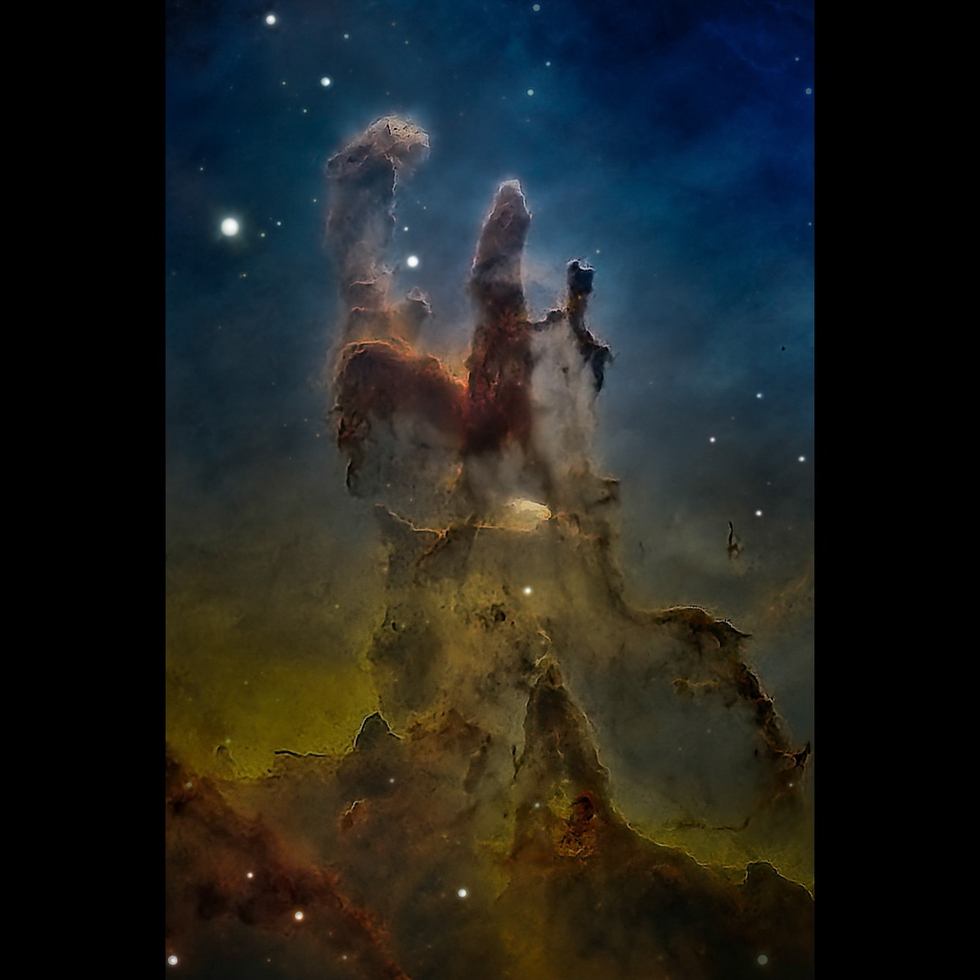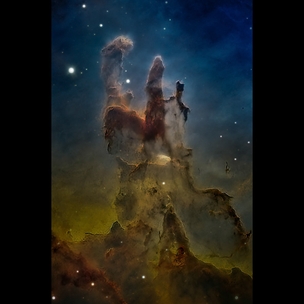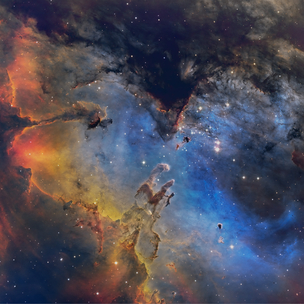Pillars of Creation inside M16
0
8
Pillars of Creation inside M16
he Eagle Nebula, also known as Messier 16 or M16, is one of the most amazing sights you can see in a large telescope. It’s the location of several famous structures, including the stunning Pillars of Creation, a star-forming region, depicted in the image above. The Eagle Nebula contains not only the Pillars of Creation but several other star-forming regions as well. It also has many emission nebulae, or clouds in space that shine with their own light. And it has some dark nebulae. These are space clouds that don’t shine themselves, but that can be seen because they obscure light from shining objects located behind them.
The Eagle Nebula lies in the direction of the constellation Serpens the Serpent. It’s about 7,000 light-years away.
.
.
.
.
.
Jean-Philippe de Cheseaux is said to have “discovered” the Eagle Nebula in 1745-46.
.
.
The mesmerizing dark protrusions of dense gas were found to be the site of the formation of new stars and solar systems. Known as the Pillars of Creation, this photograph gave most people their first view of newly born stars and solar systems at the dawn of their creation. The Pillars of Creation are immense, about 4 to 5 light-years tall. The Eagle Nebula itself spans about 70 by 55 light-years.
Similar areas, such as the Stellar Spire on the left side of the Eagle, are also forming new stars through a combination of processes. The cold, mostly hydrogen gas of the nebula has already fueled the formation of a series of young, hot stars. As the gas continues to collapse under its own gravity into the dark forms we see, new stars and solar systems form and continue to grow as they attract more and more gas to them. However, the intense light pressure from the new stars that have formed and their solar winds are eroding away the dense, cold gas pockets, diminishing new star formation and dispersing the nebulae.
At the same time however, the shock waves, where the light and solar wind impact the cold gas, heat and compress some of the cold gases at the same time, resulting in a new set of star forming environments.
The Eagle Nebula lies in the direction of the constellation Serpens the Serpent. It’s about 7,000 light-years away.
.
.
.
.
.
Jean-Philippe de Cheseaux is said to have “discovered” the Eagle Nebula in 1745-46.
.
.
The mesmerizing dark protrusions of dense gas were found to be the site of the formation of new stars and solar systems. Known as the Pillars of Creation, this photograph gave most people their first view of newly born stars and solar systems at the dawn of their creation. The Pillars of Creation are immense, about 4 to 5 light-years tall. The Eagle Nebula itself spans about 70 by 55 light-years.
Similar areas, such as the Stellar Spire on the left side of the Eagle, are also forming new stars through a combination of processes. The cold, mostly hydrogen gas of the nebula has already fueled the formation of a series of young, hot stars. As the gas continues to collapse under its own gravity into the dark forms we see, new stars and solar systems form and continue to grow as they attract more and more gas to them. However, the intense light pressure from the new stars that have formed and their solar winds are eroding away the dense, cold gas pockets, diminishing new star formation and dispersing the nebulae.
At the same time however, the shock waves, where the light and solar wind impact the cold gas, heat and compress some of the cold gases at the same time, resulting in a new set of star forming environments.
SPECIFICATIONS
Telescope
Planewave CDK24
Camera
FLI ProLine PL9000
Location
Chile
Date of observation
Apr - Oct 2022
Filters
SHO
Processing
Pixinsight/Photoshop
Credits
Debojit Chakrabarty | Telescope Live




